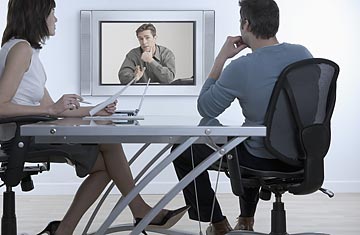
Get ready for a closeup: your next job interview might be on webcam. Companies are turning to video-chat software as a cheap, low-hassle way to vet job candidates.
The transition from in-person to online isn't without its hiccups. Fuzzy transmissions, dropped calls and unusual disruptions are all par for the course.
What's the draw? Saving time--and money. As executives at online retailer Zappos looked to cut expenses, they noticed how much the firm spent on travel. It easily cost $1,000 a pop to fly out job candidates and put them up for the night. Zappos had used Skype internally, so HR tried it for interviews.
The conclusion: a video link does a good job of replacing a meeting--and in a way a phone call can't. "If you see facial expressions and body language, you have a different sense of what a person is saying," says recruiting manager Christa Foley. Instead of flying out 20 finalists, the firm now screens online, then meets the best two or three.
Job seekers are also driving the trend. After Stephen Bhadran got laid off as a computer programmer in South Florida, he cast a wide net. The University of California, Los Angeles, wanted to set up an interview but wouldn't pay airfare. "I couldn't fly on my own dime," says Bhadran. So he suggested Skype. Bhadran ended up getting his request--and the job.
Things don't always run so smoothly. Bobby Fitzgerald, a restaurateur based in Scottsdale, Ariz., has had his amusements. For instance: the candidate who kept leaning forward, giving Fitzgerald an intimate view of his nose. Another, in college, didn't clean up his room. Then there was the candidate whose dog wouldn't stop barking. Did the disruption influence Fitzgerald? "A big part of management," he says, "is handling problems."
What should you do if your interview is via webcam?
Work on lighting.
Whether you're sitting in your kitchen or a friend's office, make sure there's no bright light behind you. That will darken your face, says Bill McGowan, a media coach in New York City.
Wear the right clothes.
Even though you're not meeting face to face, dress as though you were. Avoid patterns and the color white: both are distracting. We notice white on a screen first, and you want your interviewer drawn to your teeth and eyes, not your shirt.
Think about framing.
To avoid looking like a mug shot, swivel your chair toward the corner of your screen, then turn your head back to the camera. Sit tall but not close: the first three buttons of your shirt should be visible. When your interviewer talks, it's fine to look at his image, but when you answer, look at the camera to make "eye contact."
Do a dry run with a friend.
This way you can check color, sound and facial expressions--neutral can seem glum onscreen. And be ready to hand over your résumé as an e-mail attachment.
Finally, don't feel as if you have to pretend you're not on webcam. Deanna Reed, a principal in suburban Chicago, interviewed a teacher in Japan. "I said, 'Oh, you had to get on your suit in the middle of the night?' He said, 'No, I have my pajamas on the bottom,'" she recalls. "He had a real sense of humor." Even over video, you can make a great impression.
How to Look Good
For a video of interview dos and don'ts, go to time.com/skype_interview
